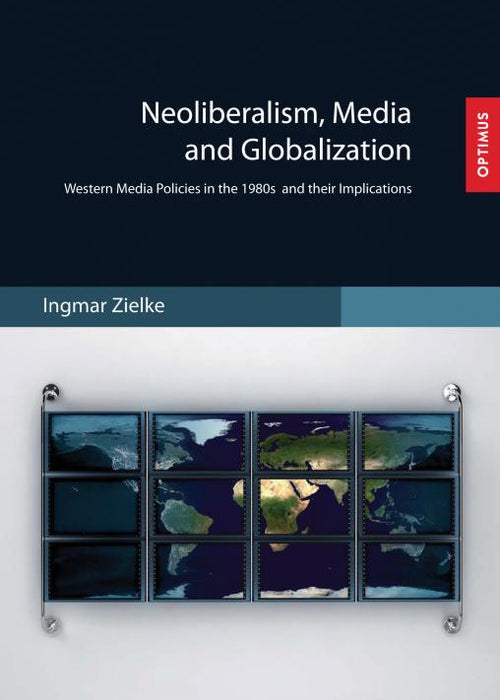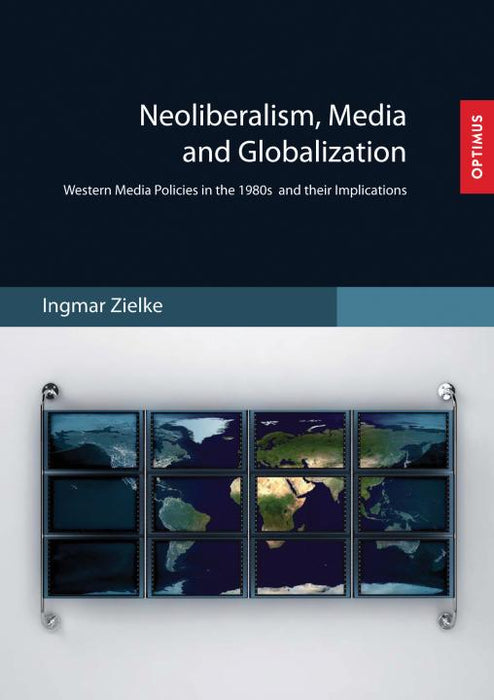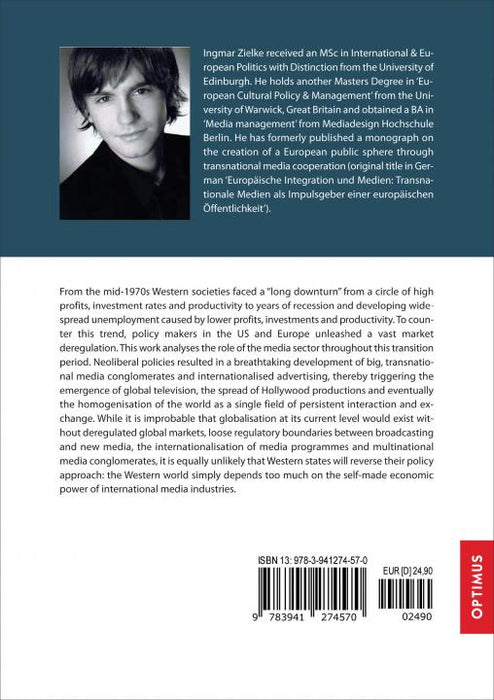Neoliberalism, Media and Globalization. Western Media Policies in the 1980s and their Implications
- Brand: Zielke, Ingmar
- Availability: In stock
- SKU: 9783941274570
€24,90
From the mid-1970s Western societies faced a "long downturn" from a circle of high profits, investment rates and productivity to years of recession and developing widespread unemployment caused by lower profits, investments and productivity. To counter this trend, policy makers in the US and Europe unleashed a vast market deregulation....
From the mid-1970s Western societies faced a "long downturn" from a circle of high profits, investment rates and productivity to years of recession and developing widespread unemployment caused by lower profits, investments and productivity. To counter this trend, policy makers in the US and Europe unleashed a vast market deregulation. This work analyzes the role of the media sector throughout this transition period. Neoliberal policies resulted in a breathtaking development of big, transnational media conglomerates and internationalized advertising, thereby triggering the emergence of global television, the spread of Hollywood productions and eventually the homogenization of the world as a single field of persistent interaction and exchange. While it is improbable that globalization at its current level would exist without deregulated global markets, loose regulatory boundaries between broadcasting and new media, the internationalization of media programs and multinational media conglomerates, it is equally unlikely that Western states will reverse their policy approach: the Western world simply depends too much on the self-made economic power of international media industries.
Details
- Title: Neoliberalism, Media and Globalization
- Subtitle: Western Media Policies in the 1980s and their Implications
- Author: Ingmar Zielke
- Edition: 1st edition
- University: University of Edinburgh (GB)
- Note: First / A
- Published: 1st edition 17.12.2010
- Subject: media studies
- Product Type: Book (Hardcover)
- Product type: Master's thesis
- Language: English
- Binding: Softcover (paperback)
- Dimensions: 21.0 x 14.8 cm (DIN A5)
- Scope: 52 pages
- Condition: New (shrink-wrapped in foil)
- Keywords: Adam Smith, Adorno, Theodor W., ARD, Bertelsmann, CDU, deregulation, economic crisis, globalization, globalization, global television, Helmuth Kohl, Keynes, liberalization, mass media, media, media market, media policies , media policy, Milton Friedman, neoliberalism, private broadcasting, privatisation, public service broadcasting, Ronald Reagan, SPD, ZDF
Table of Contents
1 Introduction
1.1 Field of exploration
1.2 Structure
2 Neoliberalism, Media and Globalization
2.1 The Comeback of Adam Smith: Neoliberalism
2.2 Media, Media Policy and the Mass
2.3 Economical and Cultural Globalization
3 Developments in the USA and Western Europe
3.1 The Long Downturn and the Comeback of Liberalism
3.2 Impacts on Cultural Industries
3.3 Media Policies in the US and in Europe in the 1970s and 1980s
4 Germany's Media Policies in the 1980s
4.1 Developments in the Western German Broadcasting
4.2 From Public Service Broadcasting to the Dual System: Monopolism or Free Flow of Information?
4.3 The Staatsvertrag of 1987
5 Conclusion and Perspective
6 Bibliography
Author
Ingmar Zielke received an MSc in International & European Politics with Distinction from the University of Edinburgh. He holds another Masters Degree in 'European Cultural Policy & Management' from the University of Warwick, Great Britain and obtained a BA in 'Media management' from Mediadesign Hochschule Berlin. He has formerly published a monograph on the creation of a European public sphere through transnational media cooperation (original title in German 'Europäische Integration und Medien: Transnationale Medien als impulse generator of a European public sphere').
Downloads
DRM: Digital Watermark
This eBook contains a digital watermark and is therefore personalized for you. If the eBook is passed on to third parties abusively, it is possible to trace it back to the source.
File format: PDF (Portable Document Format)
With a fixed page layout, the PDF is particularly suitable for specialist books with columns, tables and figures. A PDF can be displayed on almost all devices, but is only suitable to a limited extent for small displays (smartphone, e-reader).
System requirements:
PC/Mac: You can read this eBook with a PC or Mac. You need a PDF viewer - e.g. Adobe Reader.
eReader: This eBook can be read with (almost) all eBook readers. However, it is not compatible with the Amazon Kindle.
Smartphone/Tablet: Whether Apple or Android, you can read this eBook. You need a PDF viewer - e.g. Adobe Reader.
Buying eBooks from abroad
For tax law reasons we can sell eBooks just within Germany and Switzerland. Regrettably we cannot fulfill eBook orders from other countries.



